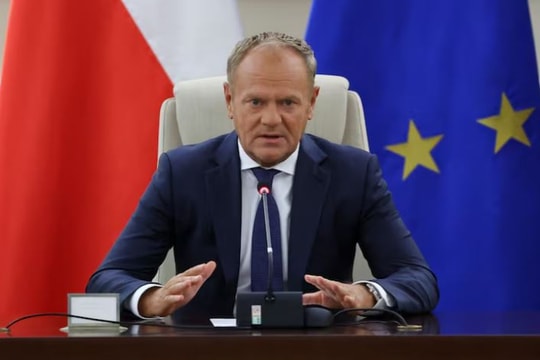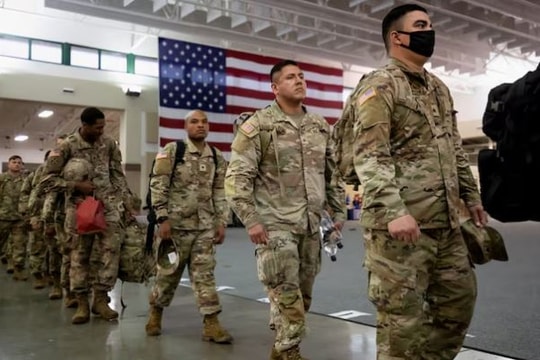General Cuong: Russia will not 'get bogged down' in Ukraine
(Baonghean.vn) - Nghe An Newspaper had an interview with Associate Professor, PhD, Major General Le Van Cuong - former Director of the Institute of Strategy and Science, Ministry of Public Security, about the latest developments of the conflict in Ukraine. According to Major General Le Van Cuong's prediction, Russia will not "get bogged down", but will end the special military campaign by the end of March at the latest.
PV:Dear Major General, on February 24, Russian President Vladimir Putin decided to launch a special military operation in Ukraine. Were you surprised by this information? In your opinion, what is the real goal of Russian President Vladimir Putin's special military operation?
Major General Le Van Cuong:On February 21, the Russian President recognized the independence of the two self-proclaimed republics of Donetsk (DPR) and Luhansk (LPR). This was a completely unexpected decision for the US and European intelligence agencies. A few days later, on February 24, Mr. Putin made another equally surprising decision for Western intelligence agencies, which was to launch a special military operation in Ukraine.
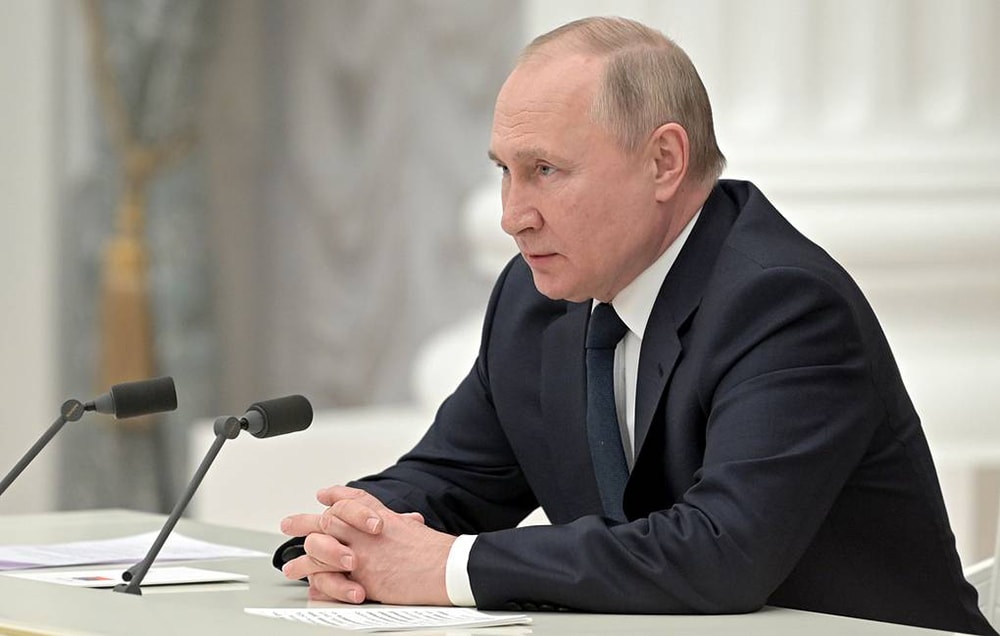 |
| Russian President Vladimir Putin. Photo: TASS |
President Putin declared: First, Russia does not invade or rob Ukraine of its land; Second, Russia does not attack Ukrainian civilians because Ukrainians and Russians are of the same race, have the same ancestors and blood. I believe that statement is correct and Mr. Putin will do so. The real goal of the special military campaign that President Putin is deploying in Ukraine is to focus on destroying Ukraine's entire military infrastructure, including destroying the command information system, the entire early warning radar system, especially the radar system of the S300 defense system, attacking military bases, military airports, military ports, even weapons depots, missiles, aircraft, tanks... From there, forcing President Zelensky's government to demilitarize, commit to neutrality, that is, not "following" the path of joining NATO. When this requirement is met, Mr. Putin will end the special military campaign.
"Mr. Putin's ultimate goal is to force the Kiev government to commit to neutralization and not join NATO."
So in the past few days, if you follow the way the Russian and Ukrainian armies fight, you will see that they do not use infantry or armored tanks, but mainly use remote-controlled projectiles from the air, with an accuracy of up to 99%. By the night of February 26, Russia had destroyed all 812 bases and important infrastructure of Ukraine.
When there is no longer a military base with "resistance" to counterattack, whether it wants it or not, sooner or later, the Zelensky government will have to change its stance, be forced to negotiate with Russia, find a diplomatic way out, and end the conflict.
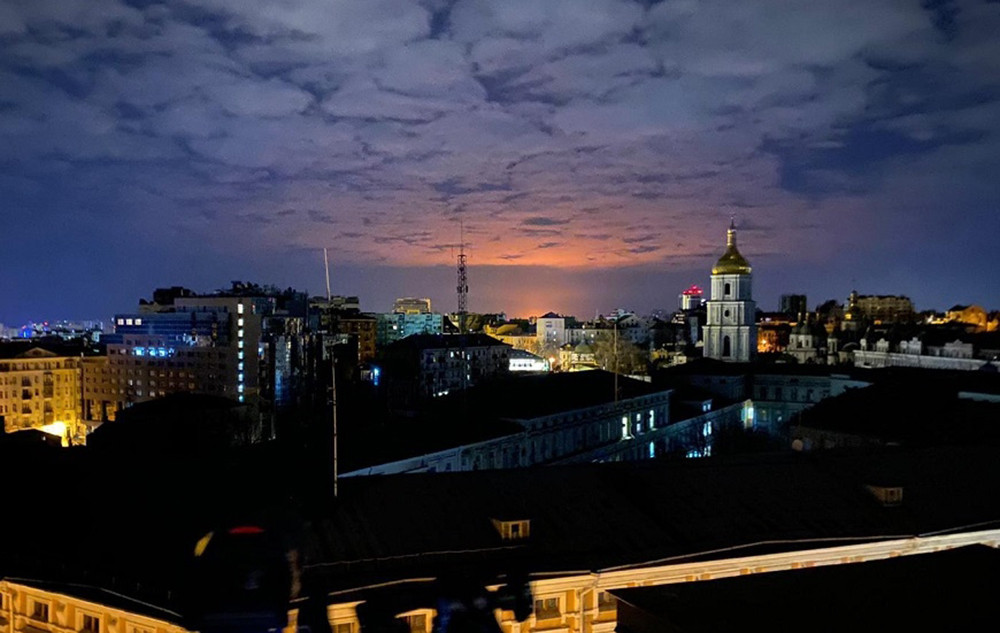 |
| The sky lit up by explosions in Kiev. Photo: CNN |
More importantly, Putin’s ultimate goal is to force the Kiev government to commit to neutralization and not join NATO. As I mentioned before, for Russia, this is a “red line” that no one can cross. At the 2008 Russia-NATO Summit in Brussels, President Putin told his US counterpart, President Bush (Jr.), that Ukraine could not exist as a state if they joined NATO. The reason is very simple: Ukraine is only 400 miles from Moscow. If they become a NATO member, the US will deploy hypersonic missiles in Ukraine, and Russia will have no way to deal with the risk of being destroyed.
PV:Can the Major General explain why Ukrainian President Volodymyr Zelensky called 27 heads of state but no one pledged to support Ukraine's entry into NATO, in the midst of "boiling water and fire", causing Mr. Zelensky to exclaim "We have been abandoned"?
Major General Le Van Cuong:In terms of politics and foreign affairs, this is essentially a matter of interests. On the scale, the interests of the US, NATO, and Europe in Russia are much greater than their interests in Ukraine. NATO and Ukraine both tasted bitter defeat in the conflicts in July-October 2014 and January 2015, forcing Kiev to "grit its teeth" and sign the Minsk II Agreement in February 2015.
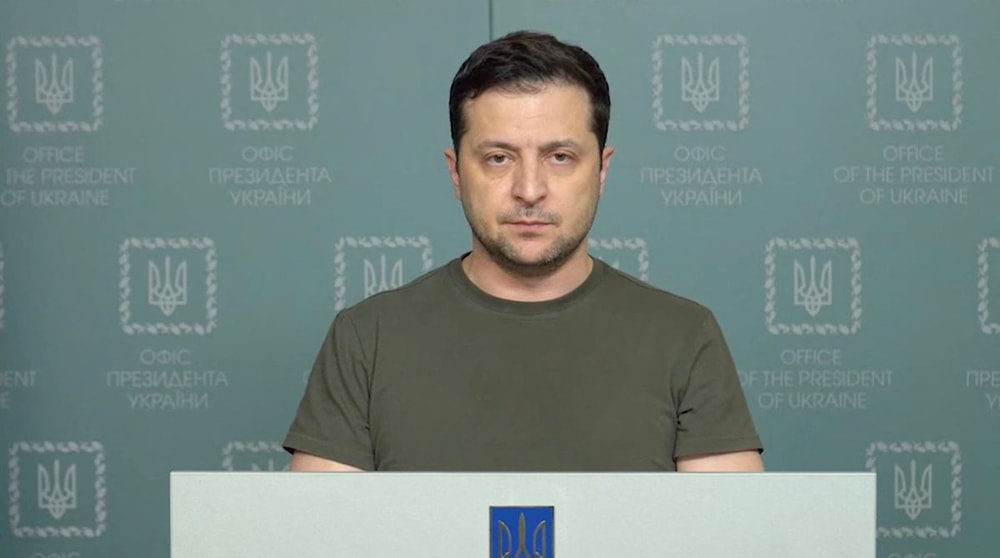 |
| On February 27, the President of Ukraine called for the withdrawal of Russia's voting rights at the United Nations Security Council. Photo: Reuters |
PV:Many people were surprised to learn that on the morning of February 25, one day after the Russian army attacked, the President of Ukraine agreed to negotiate with Russia to end the war, even willing to negotiate the issue of neutralizing Ukraine, but in the afternoon of the same day, Mr. Zelensky himself changed his mind, no longer participated in the negotiations, and even proposed to negotiate not in Belarus but in Warsaw (Poland). According to the Major General, how can we understand this erratic change?
Major General Le Van Cuong:Here I think there are two reasons. From within, the Zelensky government after the 2019 election consisted of an absolute majority of fiercely anti-Russian elements. In March 2019, Mr. Zelensky's election program clearly stated that if he became president, he would integrate Ukraine into the European economy, bring Ukraine into NATO, calm the situation in Donbass and take back Crimea from Russia. But in Zelensky's cabinet, even though it was a minority, there were some who wanted to maintain a balance between Russia and the West. So when the pro-Western forces won, Zelensky was determined to fight Russia to the end, and when times were difficult, it was this minority force that also suggested that he should recalculate, the best way was to negotiate with Russia to restore peace and ease the suffering of the people.
Besides the internal causes, the external factors are the far-right forces, mainly the US Wall Street industrial complexes that need to provoke a conflict to consume weapons and make profits, and the anti-Russian forces in Europe that incite more, even promise to support Mr. Zelensky, also contribute to the Ukrainian leader's rapid change of mind.
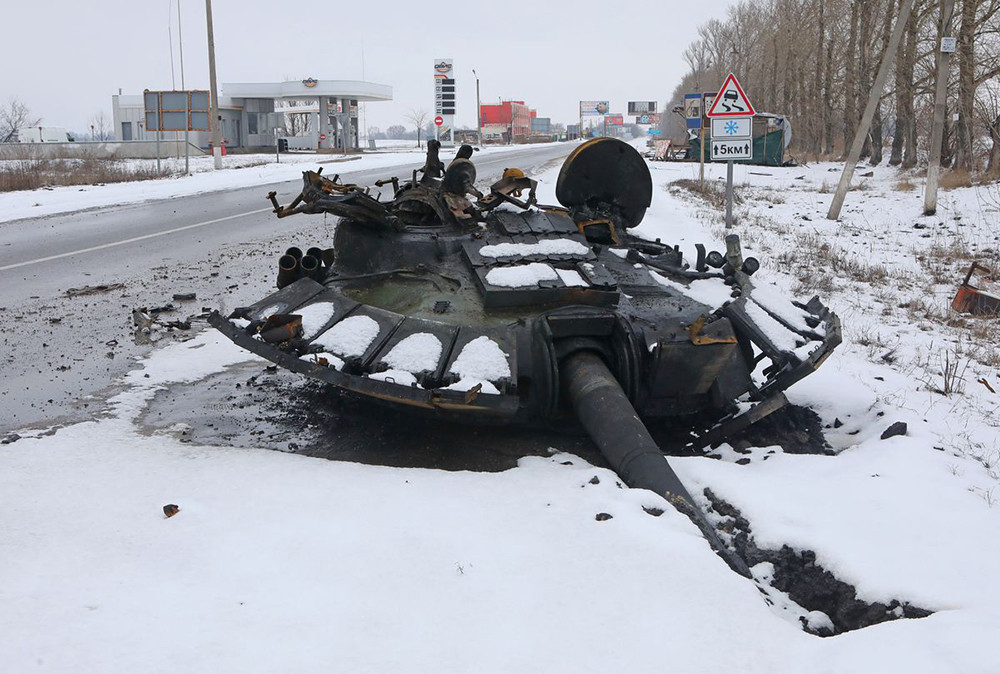 |
| Tank wreckage on the roadside in Kharkiv, Ukraine on February 26. Photo: Reuters |
PV:When the Ukrainian President refused to negotiate, the Russian President decided to continue the special military campaign, declaring that there was no other way. Since February 27, the US and Europe have expelled Russia from the SWIFT system and implemented a series of measures, both providing weapons and providing billions of dollars in financial resources to revive the Kiev government. Public opinion now asks whether the US and its NATO and European allies providing weapons and finance to Ukraine can change the current conflict situation?
Major General Le Van Cuong:People often say “Looking at the basket and throwing away the rice”, Ukraine is a basket with holes, already broken, no matter how much weapons and money the West pours in, the weak government, not putting the interests of the country first, not looking for the peaceful life of the people but rushing into this blind war of chance cannot change the situation on the battlefield. The strength in the fight lies in the correctness of the strategy and policy of the military leader, shown in the great solidarity of millions of people as one. In Ukraine, the people and the army do not want to fight against Russia because they know that doing so will be a complete failure.
PV:Some say Russia will get bogged down in Ukraine and with the new sanctions package from February 27, Moscow will face difficulties and be forced to back down in the face of Western demands. Does the Major General agree with this view?
Major General Le Van Cuong:It is true that there have begun to be comments and opinions, including those of Western scholars and politicians, that the recent sanctions package will weaken Russia, bankrupt it financially and economically, and force it to back down. But I think differently. In preparation for the two decisions to recognize the independence of DPR and LPR, as well as to deploy a special military campaign in Ukraine, the Russian President has calculated every way, there is no plan beyond Mr. Putin's control. Certainly, the US and the West will apply all possible measures to encircle, embargo, and strangle the Russian economy, and I believe that in the past two years, the Russian President has also prepared to deal with it. Even removing Russia from the international financial system SWIFT, not only will Russia suffer losses and difficulties, but also the countries that buy Russian oil will have difficulties.
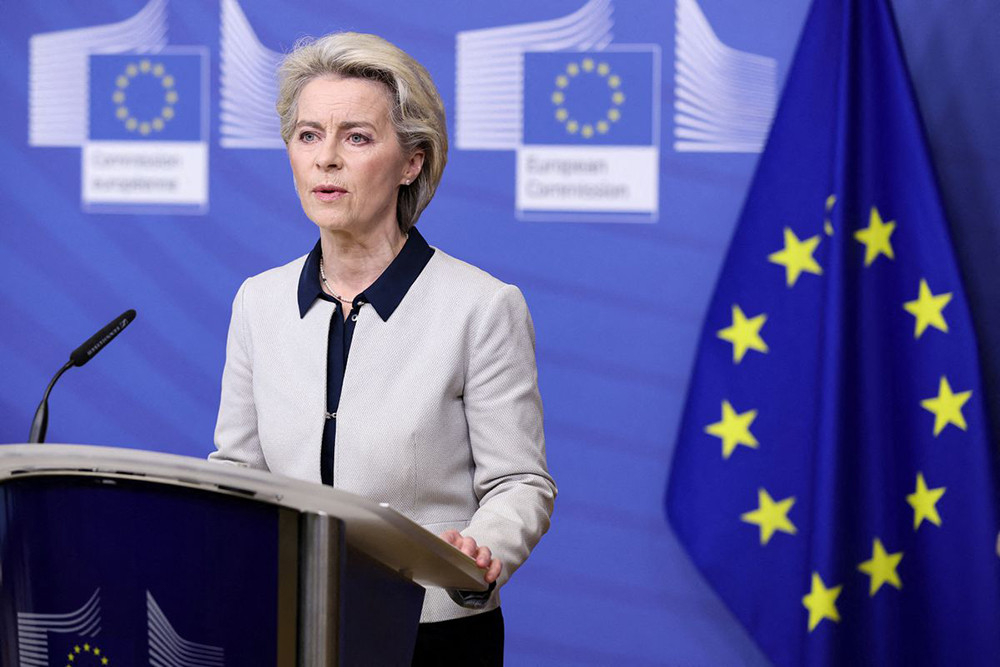 |
| The US and its allies punish the "Russian fortress" by expelling it from SWIFT. Photo: Reuters |
PV:So, where do you think Russia's war in Ukraine will go in the near future? Will it break out into a full-scale war between Russia and NATO? Can you name some scenarios that could take place in the coming days?
"I think this war is limited to the scope between Russia and Ukraine."
Major General Le Van Cuong:Talking about total war between Russia and NATO, there will be two levels. If the total force uses nuclear weapons, which means starting World War III, then I think this worst-case scenario will not happen. This is not the time for Washington and Brussels to dare to rush into a collective life-and-death war. As for the remaining force using conventional weapons, I think it is also very unlikely, because the conventional weapons confrontation between NATO and Russia took place in the second half of 2014 and January 2015, they already know each other! If conventional weapons are deployed under nuclear, NATO cannot defeat Russia, and there is a risk of the European economy collapsing. Therefore, I think this war will be limited to the scope between Russia and Ukraine.
The situation between Ukraine and Russia is changing hour by hour, day by day, no one dares to make a forecast too far. But I think, first of all, Russia will not "get bogged down" in Ukraine, by all means will quickly end this special military campaign, as early as next week, and at the latest by the end of March. The following scenarios may occur. First, Russia will completely destroy Ukraine's military infrastructure and Kiev will have to accept negotiations and neutralization. Second, in a time of urgency, the Ukrainian government will react internally to President Zelensky, who knows, there will be a coup, a change that will bring another leadership team in Kiev capable of negotiating with Russia to end the military conflict. Third, in this context, Mr. Zelensky feels helpless, resigns and leaves the country. These are scenarios that can be put on the scale, should not be ruled out.
PV:Thank you, General, for this conversation!

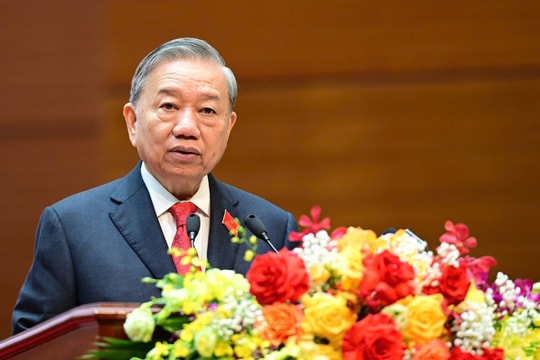
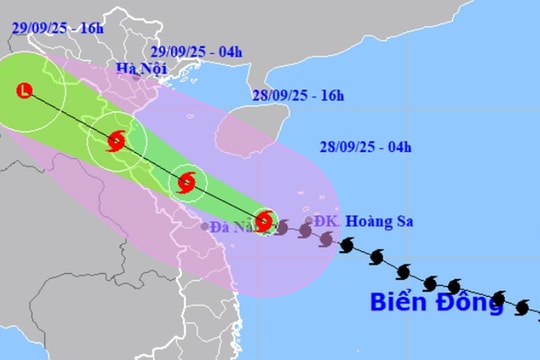
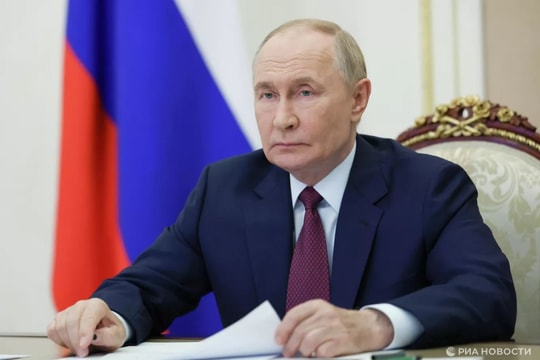
.jpg)

